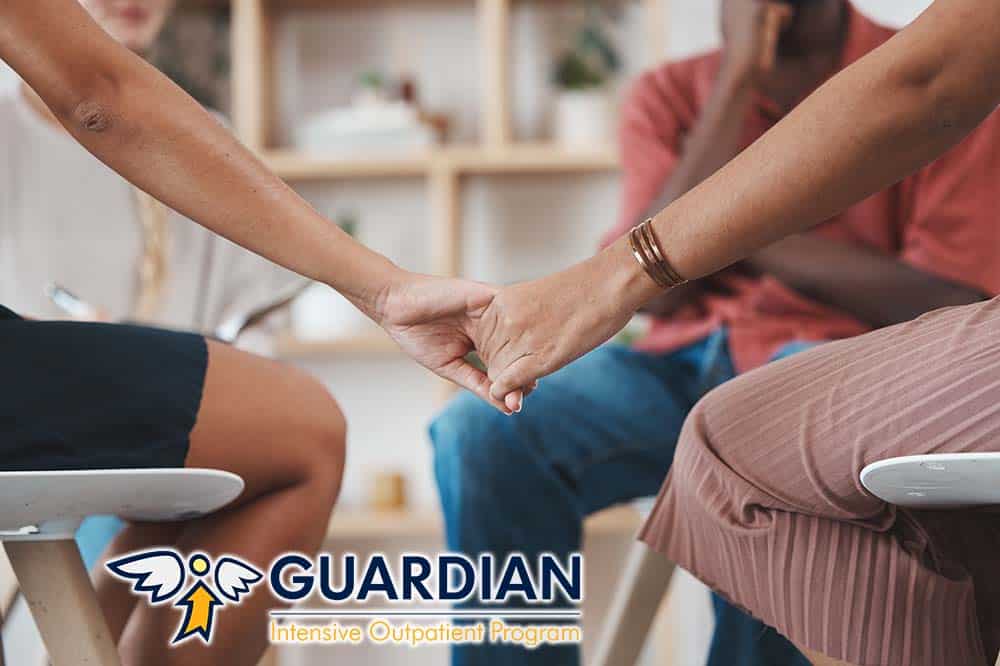Addiction is a chronic disease that has an impact on the entire family, endangering economic and interpersonal security. Family members of a person with an addiction often experience anxiety, sadness, fear, anger, and frustration as they watch their loved one’s life and health deteriorate.
If you or someone you care about is struggling with drug addiction, the experienced, trusted professionals at Guardian Recovery Network can help. We provide comprehensive treatment, including medically-assisted detox, therapy, specialty programs, and reintegration support. Our caring and skilled administrative, medical, and clinical teams will guide you through every step of your recovery process from the first time you call. We provide a complimentary assessment and a free insurance benefits check and help coordinate local travel to our facility. All you have to do is ask; we will take care of the rest. Contact us today.
The Impact of Addiction on Family Members
When someone in your family has an addiction, you and your family can experience fear, guilt, helplessness, and many other negative emotions. You may feel betrayed, especially if your loved one is dishonest or secretive about using illicit drugs or their activities around getting drugs. Financial concerns can also arise if they can’t contribute to household expenses because of work absenteeism or if they get into legal trouble. In addition, family relationships can be strained or damaged due to the chaos and dysfunction of addiction.
The Benefits of Family Support in Addiction Recovery
While you may not want to engage with someone who is turning your life upside-down, family support is vital to addiction recovery. It can provide emotional and practical and help rebuild the bonds broken by addiction. Family involvement benefits everyone in the long run, especially the person in recovery. According to the Substance Abuse and Mental Health Services Administration (SAMHSA), family involvement can help reduce the risk of relapse and improve treatment outcomes.
The Role of Family Therapy in Addiction Recovery
Family therapy helps family members understand addiction and its impact on family dynamics. The therapist helps family members to develop healthy communication and coping skills. It can also help improve the mental health of family members by reducing anxiety and depression.
The benefits of family therapy are not limited to the patient’s recovery but also extend to the entire family. It can help strengthen family relationships, reduce conflict, and improve overall well-being. Family therapy has also been shown to improve addiction recovery outcomes by helping family members communicate better, identify conflicts and work on solutions together.
We Are Here For You
Let Us Help You Heal
Our Drug & Alcohol addiction treatment experience is second to none.
Learn how we can help by speaking with one of our Treatment Advisors today.
How Family Support Contributes to Positive Treatment Outcomes
Consistent family support has been linked to higher rates of abstinence, reduced cravings, and reduced relapse rates. Studies have shown that patients with supportive families have better treatment outcomes than those whose families make them go it alone.
Family support can also enhance your loved one’s motivation to continue treatment. It helps them feel valued and loved and increases their self-esteem, which is essential in recovery.
Strategies for Families to Support a Loved One in Recovery
Having a strategy can help make supporting a loved one in recovery easier. Here are a few tactics you may want to try:
- Provide emotional support. Listen to your loved one without judgment and try to understand their perspective.
- Offer practical assistance. This may include helping with bills, housework, or daily tasks that the person in recovery may find difficult to manage.
- Find resources for support and treatment options. If a family member struggles with addiction, help them find information about local treatment programs or specialty services like 12-Step groups.
- Give positive reinforcement and encouragement. For example, praise the individual for recovery-related accomplishments and let them know you are proud of them for taking steps towards a healthier life.
When family members are involved in recovery, they become more aware of addiction-related issues. It also helps them to develop new skills and coping mechanisms to manage the stress associated with addiction.
Addressing Family Communication Issues in Addiction Recovery
Family communication can be a significant issue in addiction recovery. Often, communication has suffered while the person was using drugs. Reestablishing communication can be challenging when trust has been broken, but the effort is worth it. Good communication can alleviate stress between family members and reduce the risk of relapse.
Family therapy can help improve communication. It allows open and honest discussion about difficult topics like addiction, enabling behavior, and relapse prevention. A therapist can help facilitate healthy conversations and create a safe space for everyone to share their thoughts, feelings, and experiences. These conversations help family members better understand each other’s perspectives, identify conflicts, and work toward solutions.
Practicing active listening helps create an environment of understanding and acceptance. Active listening involves paying attention, using empathy, and showing that you’re really hearing what is being said. This can help family members feel heard and respected, which is essential for successful communication.
It is also important for families to focus on common goals and values when communicating. When everyone focuses on the same goal — such as the patient’s recovery — it can help maintain a sense of unity instead of creating conflict. Identifying shared values can also strengthen family bonds and make a healthier emotional connection between family members.
Families can build trust within their relationships by speaking honestly, offering support and validation, respecting each other’s boundaries, taking responsibility for mistakes, and apologizing when necessary. Working together, you can build healthier relationships that promote successful addiction recovery by creating a safe, accepting environment for open communication.
How to Navigate Relapses & Continuing Care with Family Support
Relapse is a common part of the recovery process, but it does not mean that treatment has failed or that all progress has been lost. With support from family and friends, those in recovery can make it through challenging times, learn from their mistakes and get back on track with treatment.
The Importance of Self-Care When Someone Relapses
It’s crucial that you first focus on self-care and understand that a relapse is not your fault. It can be challenging to watch someone you love go through tough times—but caring for yourself is just as important as helping your loved one during these moments.
Once you have seen your needs, offer unconditional love and acceptance while setting healthy boundaries with your loved one. Boundaries provide safety by limiting the circumstances in which substance abuse is acceptable.
Dealing with a loved one struggling with substance dependence can be stressful, but staying positive and encouraging throughout recovery is vital to long-term sobriety. Letting your loved one know that you are there to provide love and understanding can help motivate them to keep making progress toward achieving their goals and benefit the entire family.
Begin Healing Now!
Have A Call With One Of Our Treatment Advisors
Don’t Suffer Any Longer
Contact Us Today
Substance abuse can take a toll on the entire family, but supporting your loved one struggling with addiction is crucial to their journey to recovery. Family therapy can help break down communication barriers and create a deeper understanding of what it is like to experience substance dependence. No matter the substance, the best way to overcome addiction is with the help of experienced, trusted professionals like those at Guardian Recovery Network. We provide comprehensive treatment, including medically-assisted detox, therapy, specialty programs, and reintegration support. Our caring and skilled administrative, medical, and clinical teams will guide you through every step of your recovery process from the first time you call. We provide a complimentary assessment and a free insurance benefits check and help coordinate local travel to our facility. All you have to do is ask; we will take care of the rest. Contact us today.
Get Started Now
Give us a call 24/7
(888) 693-1894


Reviewed for accuracy by:
Anna Marie Barrett LCSW, CYT
Anna earned her Masters of Social Work at Barry University in Miami, FL in 2017 and completed her internship in co-occurring disorders. Anna has a Bachelors of Art in Religious Studies from Naropa University and is a certified yoga and meditation instructor. Anna has received specialized training in somatic counseling with an emphasis on body-centered psychotherapy.




















